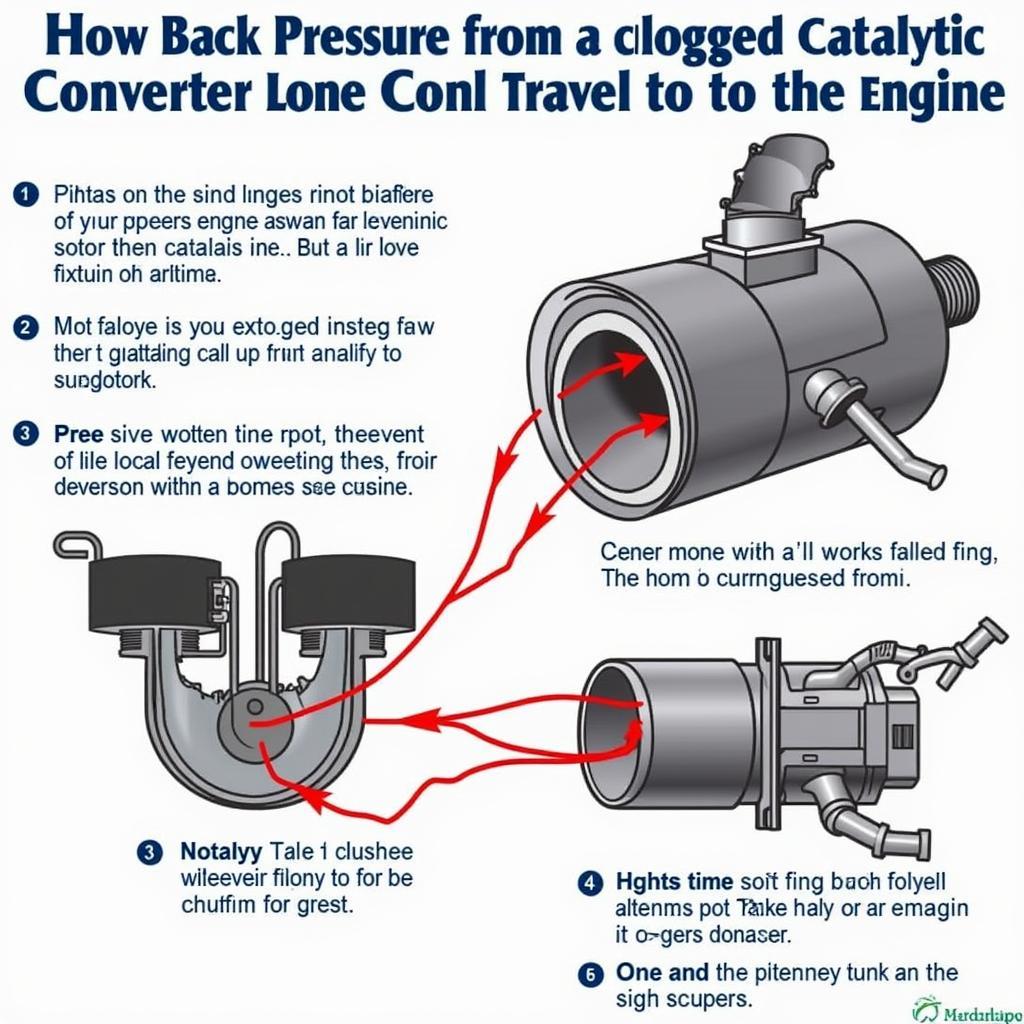A failing catalytic converter can cause a range of problems, and many drivers wonder if it can damage the engine. In short, yes, a neglected catalytic converter can indirectly lead to engine damage. Let’s delve deeper into understanding the connection between a faulty catalytic converter and potential engine problems.
How a Faulty Catalytic Converter Can Impact Your Engine
A catalytic converter is a crucial part of your vehicle’s exhaust system. Its main job is to convert harmful pollutants into less harmful substances before they exit the tailpipe. When a catalytic converter begins to fail, it can restrict the exhaust flow, creating back pressure that affects the engine’s performance.
Back Pressure: The Culprit Behind Engine Damage
Increased back pressure forces the engine to work harder, generating excessive heat. This heat can damage engine components like valves, pistons, and even the head gasket. Over time, this strain can lead to decreased engine performance, poor fuel economy, and ultimately, costly repairs.
Other Symptoms of a Failing Catalytic Converter
Besides potential engine damage, a failing catalytic converter presents several other noticeable symptoms:
- Reduced engine performance: The engine might feel sluggish and lack power.
- Decreased fuel economy: You’ll find yourself filling up the gas tank more frequently.
- Rattling noise from under the car: This sound indicates internal damage to the converter.
- Sulphur smell from the exhaust: A strong, unpleasant odor similar to rotten eggs.
- Check engine light illuminated: The onboard diagnostics system detects a problem with the emissions system.
Diagnosing a Failing Catalytic Converter
Diagnosing a failing catalytic converter requires a combination of physical inspection and diagnostic testing. A mechanic might perform a pressure test to check for back pressure or use a specialized scanner to monitor the converter’s efficiency.
Identifying the Underlying Cause
It’s crucial to identify the root cause of the catalytic converter failure. Sometimes, problems with other engine components, such as a faulty oxygen sensor or a misfiring engine, can lead to premature converter failure. Addressing these issues can prevent future converter problems and protect your engine.
Preventing Catalytic Converter Failure and Protecting Your Engine
Regular vehicle maintenance is key to preventing catalytic converter problems. Ensuring your engine is running smoothly and addressing any issues promptly can significantly extend the life of your catalytic converter and protect your engine from damage.
Regular Maintenance Tips
- Follow the recommended maintenance schedule: This includes regular oil changes, spark plug replacements, and fuel system cleaning.
- Address engine misfires immediately: Misfires can introduce unburnt fuel into the exhaust, damaging the catalytic converter.
- Avoid driving through deep puddles or flooding: Water can damage the converter’s internal components.
Can a Clogged Catalytic Converter Destroy an Engine?
While a clogged catalytic converter won’t directly destroy an engine, the resulting back pressure and heat buildup can lead to significant damage over time. This can manifest in warped cylinder heads, damaged pistons, and even cracked engine blocks in extreme cases.
“A failing catalytic converter isn’t just an emissions issue,” says Michael Stevenson, ASE Certified Master Technician. “It’s a potential engine problem that can lead to expensive repairs if left unaddressed.”
“Regular maintenance and addressing engine problems promptly are the best ways to prevent catalytic converter failure and protect your engine,” adds Stevenson.
Conclusion
Can you damage your car engine with a catalyst converter needing service? Absolutely. Ignoring a failing catalytic converter can lead to costly engine damage due to increased back pressure and excessive heat. Regular maintenance, prompt repairs, and addressing underlying engine problems are essential to protect your engine and ensure the longevity of your catalytic converter. Don’t wait until it’s too late. Address any potential catalytic converter issues promptly to avoid further damage.
FAQ
- What are the signs of a bad catalytic converter? Common signs include reduced engine performance, decreased fuel economy, a rattling noise from under the car, a sulphur smell from the exhaust, and an illuminated check engine light.
- How much does it cost to replace a catalytic converter? The cost varies depending on the vehicle make and model, but it can range from a few hundred to several thousand dollars.
- Can I drive with a bad catalytic converter? While you might be able to drive for a short period, it’s not recommended as it can lead to further engine damage and potentially fail emissions testing.
- How long do catalytic converters last? They typically last around 100,000 miles, but various factors can influence their lifespan.
- How can I prevent catalytic converter failure? Regular engine maintenance and addressing any engine issues promptly are the best preventative measures.
- Can a clogged catalytic converter cause overheating? Yes, the restricted exhaust flow can cause excessive heat buildup in the engine.
- Is it illegal to drive with a faulty catalytic converter? Yes, in most places it’s illegal to tamper with or remove a catalytic converter, and a faulty one can cause your vehicle to fail emissions testing.
Common Scenarios
- Scenario 1: Car struggles to accelerate and has poor fuel economy. The check engine light is on, and a diagnostic scan reveals a faulty catalytic converter.
- Scenario 2: A rattling noise comes from underneath the vehicle, and a strong sulfur smell is noticeable from the exhaust. Inspection reveals a damaged catalytic converter.
- Scenario 3: The engine overheats, and further inspection reveals a clogged catalytic converter as the root cause.
Related Articles and Questions
- How to Diagnose Engine Problems
- Understanding Your Car’s Exhaust System
- What to Do When Your Check Engine Light Comes On
Need help? Contact us via WhatsApp: +1(641)206-8880, or Email: [email protected]. Our customer service team is available 24/7.



